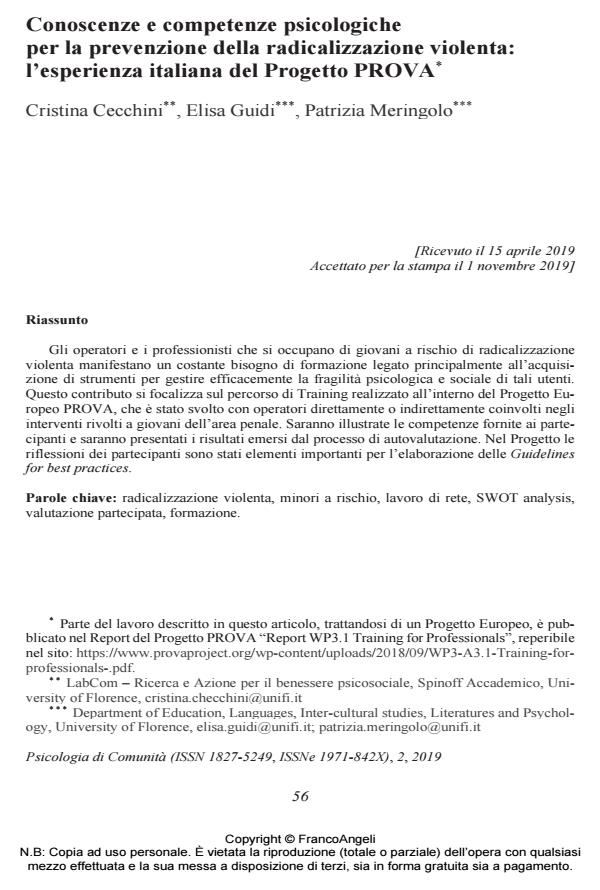Psychological knowledge and skills for preventing violent radicalization: the Italian experi-ence of the PROVA Project
Journal title PSICOLOGIA DI COMUNITA’
Author/s Cristina Cecchini, Elisa Guidi, Patrizia Meringolo
Publishing Year 2020 Issue 2019/2 Language Italian
Pages 19 P. 56-74 File size 232 KB
DOI 10.3280/PSC2019-002005
DOI is like a bar code for intellectual property: to have more infomation
click here
Below, you can see the article first page
If you want to buy this article in PDF format, you can do it, following the instructions to buy download credits

FrancoAngeli is member of Publishers International Linking Association, Inc (PILA), a not-for-profit association which run the CrossRef service enabling links to and from online scholarly content.
Professionals and educators working with youth at risk of violent radicalization may show a stable need for training, mainly related to the learning of tools able to effectively cope with minors’ social and psychological fragility. This contribution is focused on the Training developed during the European Project PROVA, carried out with professionals directly and indirectly involved in interventions with minors under proceedings. Competences provided to par-ticipants will be described and results coming from the self-evaluation process will be showed. In the Project, participants’ feedbacks were important aspects to produce Guidelines for best practices.
Keywords: Violent radicalization, minors at risk, networking, SWOT analysis, participatory evaluation, training.
- Ajzen, I. (1991). The theory of planned behavior. Organizational behavior and human decision processes, 50(2), 179-211. DOI: 10.1016/0749-5978(91)90020-
- Ajzen, I., & Fishbein, M. (1980). Understanding attitudes and predicting social behaviour. Prentice Hall: Englewood Cliffs (NJ).
- Braun, V., & Clarke, V. (2006). Using thematic analysis in psychology. Qualitative research in psychology, 3(2), 77-101.
- Doosje, B., Moghaddam, F. M., Kruglanski, A. W., de Wolf, A., Mann, L., & Feddes, A. R. (2016). Terrorism, Radicalization and De-radicalization. Current Opinion in Psychology, 11, 79-84.
- DORS (2015). Partecipazione e empowerment per la salute. Fact sheet, 10. -- Retrieved from https://www.dors.it/alleg/newcms/201502/PE_fact_sheet_2015.pdf
- Ebener, P. A., Hunter, S. B., Adams, R. M., Eisenman, D., Acosta, J. D, & Chinman, M. (2017). Getting to Outcomes. Guide for community emergency preparedness. Santa Monica, CA: RAND Corporation.
- Ehrkamp, P., & Leitner, H. (2006). Rethinking immigration and citizenship: new spaces of migrant transnationalism and belonging. Environment and Planning, 38, 1591-1597.
- Fishbein, M., & Ajzen, I. (1975). Belief, attitude, and behavior: An introduction to theory and research. Addison Wessley: Reading, MA.
- Helms, M. M., & Nixon, J. (2010). Exploring SWOT analysis – where are we now? A review of academic research from the last decade. Journal of Strategy and Management, 3(3), 215-251. DOI: 10.1108/1755425101106483
- Kagan, C., Burton, M., Duckett, P., Lawthom, R., & Siddiquee, A. (2011). Critical community psychology. West Sussex, UK: Wiley.
- Labonté, R., & Laverack, G. (2008). Health promotion in action: from local to global empowerment. London: Palgrave Macmillan.
- Laverack, G. (2004). Health promotion practice: power and empowerment. London: Sage Publications.
- McMahon, S. D., Felix, E. D., Halpert, J. A., & Petropoulos, L. A. N. (2009). Community violence exposure and aggression among urban adolescents: Testing a cognitive mediator model. Journal of Community Psychology, 37(7), 895–910.
- Meringolo, P., Volpi, C., & Chiodini, M. (2019). Community Impact Evaluation. Telling a stronger story. Community Psychology in Global Perspective, 5(1), 85-106.
- Meringolo, P. (2017). Progetto Europeo Erasmus Plus’PROVA’: Prevenire la radicalizzazione violenta. Psicologia di Comunità. Newsletter, Anno XXVII, n. 36, Dicembre, 16-18.
- Moghaddam, F. M. (2005). The staircase to terrorism: A psychological exploration. American Psychologist, 60(2), 161-169. DOI: 10.1037/0003-066X.60.2.16
- PROVA (2016-2018). Prevention of violent Radicalisation and of Violent Actions in intergroup relations. Funded by EU under the Erasmus+ Programme (580365-EPP-1-2016-1-IT-EPPKA3-IPI-SOC-IN 2016-2018) -- Retrieved from https://www.provaproject.org
- PROVA. (2018). Guidelines. -- Retrieved from https://www.provaproject.org/outcomes/guidelines/
- Radicalisation Awareness Network – RAN EDU (2016). School leaders and prevention of radicalisation. -- Retrieved from https://ec.europa.eu/home-affairs/what-we-do/networks/radicalisation_awareness_network/about-ran/ran-edu_en
- Radicalisation Awareness Network RAN (2019). Training for First-Line Practitioners. -- Retrieved from https://ec.europa.eu/home-affairs/sites/homeaffairs/files/what-we-do/networks/radicalisation_awareness_network/docs/training_infographic_en.pdf
- Stringer, H. (2019). Improving mental health for inmates. Monitor on Psychology, 3, 47-53. -- Retrieved from https://www.apa.org/monitor/2019/03/mental-heath-inmates
- Wilkinson, D. L, & Carr, P. J. (2008). Violent youths’ responses to high levels of exposure to community violence: What violent events reveal about youth violence. Journal of Community Psychology, 36(8), 1026-1051.
Cristina Cecchini, Elisa Guidi, Patrizia Meringolo, Conoscenze e competenze psicologiche per la prevenzione della radicalizzazione violenta: l’esperienza italiana del Progetto PROVA in "PSICOLOGIA DI COMUNITA’" 2/2019, pp 56-74, DOI: 10.3280/PSC2019-002005